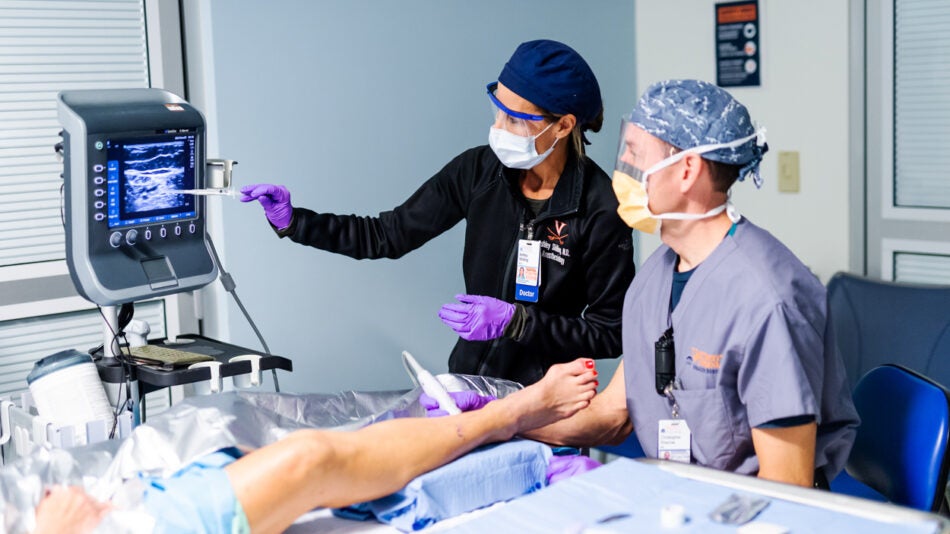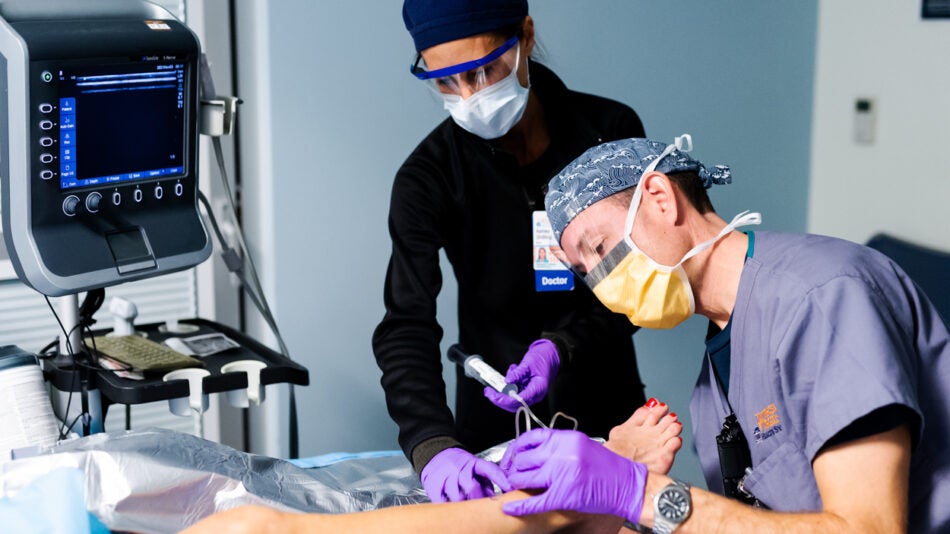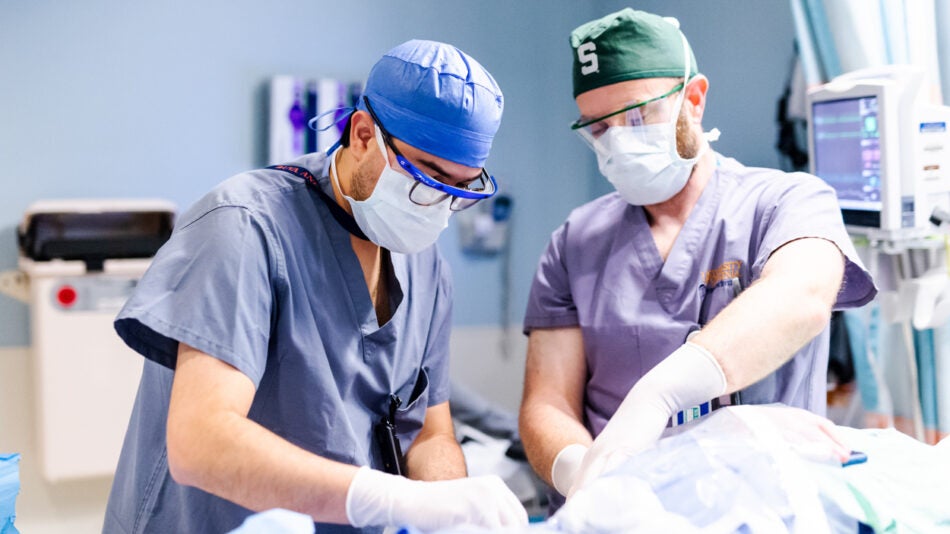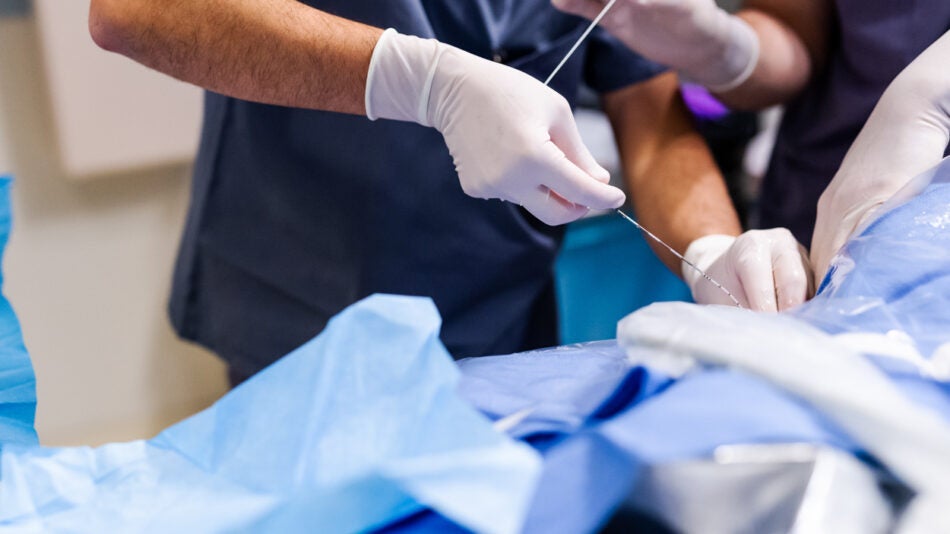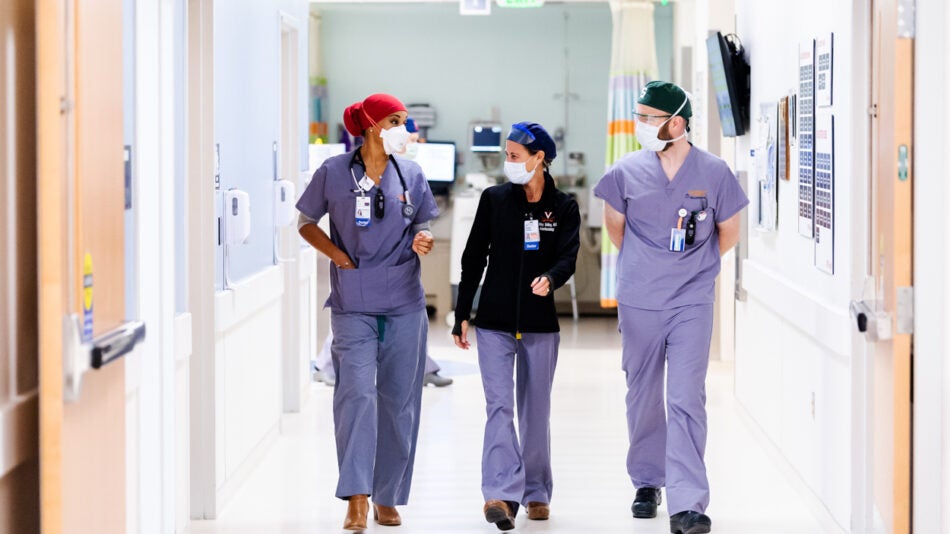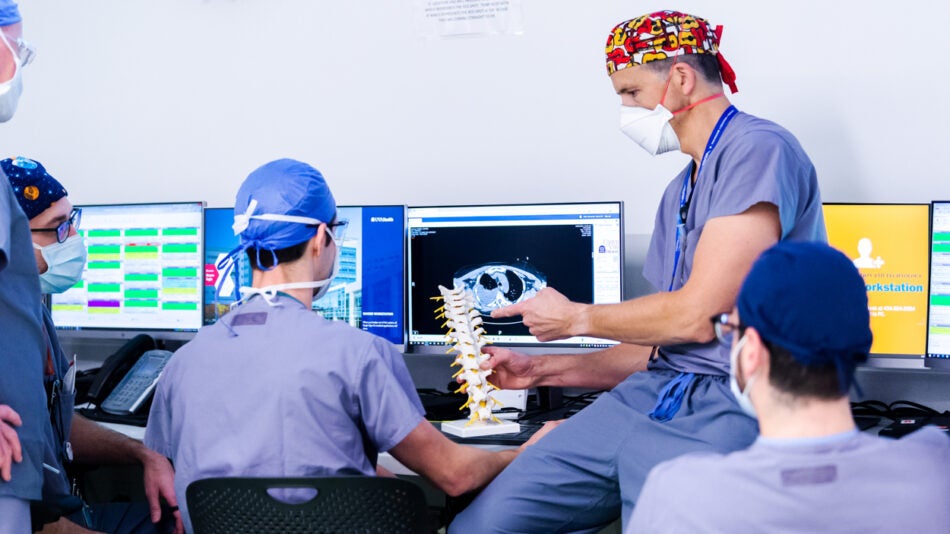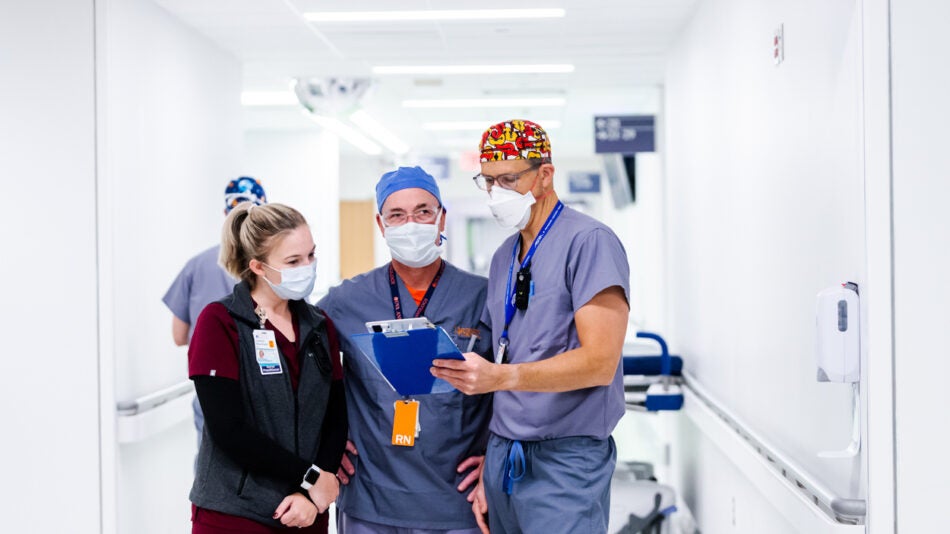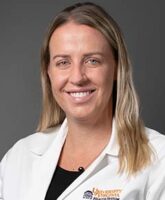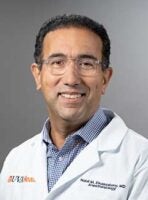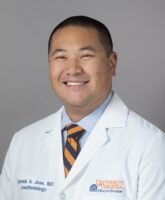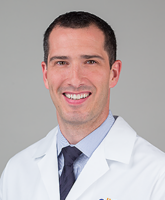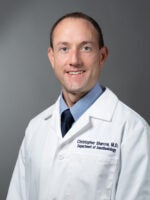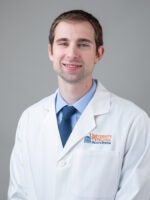Regional Division
About
The Regional and Acute Pain Division at the University of Virginia (UVA) comprises fourteen faculty whose primary focus is treating patients’ acute pain using regional anesthesia and multimodal analgesia. The regional techniques offered include: peripheral nerve blocks, continuous peripheral nerve catheters, and neuraxial procedures. The Regional and Acute Pain Division provides care in three locations: the University of Virginia Medical Center, the Outpatient Surgical Center, and the orthopedic Center at Ivy Road (OCIR). The three locations are home for close to fifty operating rooms.
Our busy clinical division provides consultation and care for both surgical and medical patients. The Division annually performs more than 8,000 peripheral nerve blocks and continuous catheters annually, over 2,500 neuraxial techniques, and participates in perioperative consults daily.
The Acute Pain Service cares for medical and surgical patients within the roughly 800 bed hospital and provides services to patients every day of the year. The Division works closely with all surgical and medical services, providing a high volume of consultations and procedures for the departments of Orthopedic, Plastic, Vascular and General Surgeries. We provide a multidisciplinary approach to optimize patient care and patient outcomes using evidence-based medicine.
Our Division has a robust commitment to teaching, and prides itself on educating fellows, residents, and medical students. There are currently two accredited Regional and Acute Pain Medicine (RAAPM) fellows and two non-accredited fellowship positions. In addition to learning regional and acute pain, we emphasize modern Point of Care Ultrasound (POCUS) education throughout the health system.
A Message from the Division Chief
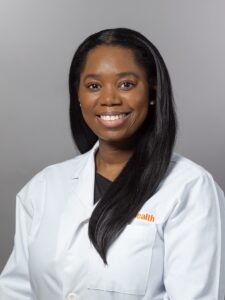
Iyabo Muse, MD Division Chief of Regional Anesthesia, Associate Professor
The Division of Regional Anesthesiology and Acute Pain Medicine at the University of Virginia consists of experts in the use of regional anesthesia and multimodal pain therapies for management of perioperative pain. We provide exemplary anesthesia care for patients undergoing a variety of surgical procedures from orthopedic procedures such as major joint replacement surgeries and sports medicine, to other surgeries such as plastic, vascular, gynecological, and general surgeries.
All of our faculty are highly skilled and experienced in the use of ultrasound. We currently have 14 faculty members with diverse training and experiences from renowned institutions. Our faculty have received national and international recognition as leaders in advancing the practice of regional anesthesia and hold leadership positions in major anesthesiology societies, such as ASRA, ASA, and SAMBA. They are innovators in education, have won teaching awards, and have taught international courses and workshops.
One of our team goals is to provide individualized patient care for optimal acute pain management utilizing ultrasound-guided peripheral nerve blocks and neuraxial anesthesia to minimize the reliance on opioids in the perioperative setting. The service we provide is a major reason for the success of the various Enhanced Recovery After Surgery (ERAS) protocols, and it allows traditionally inpatient procedures to de done as same-day procedures. Joint replacement surgery is a great example of these procedures. It is very satisfying to see patients walk within hours after surgery with minimal pain and going home feeling comfortable and optimistic about their rehab.
As experts in ultrasound guidance, the regional team have also played an important role in educating and advancing the use of Point of Care Ultrasound (POCUS) for perioperative management of patients at UVA. Not only are we needed for optimal perioperative pain management, we use bedside ultrasound to help evaluate patients’ volume status and diagnose cardiovascular and pulmonary issues in the perioperative setting.
However, most importantly, what I value most within UVA’s Division of Regional Anesthesia is the camaraderie, collaboration, and support among members of the division, our surgical colleagues, nurse anesthetists, and the regional perioperative nurses. We all have the same goal: ‘providing safe, efficient, and effective care to all of our patients.’
Acute Pain Service (APS)
The Acute Pain Service (APS) care team is here to help navigate patients through their hospitalization more comfortably. Our experienced team is able to add specialized medications or nerve blocks to improve patient pain control. We can also aid the surgical or medical team in utilizing existing pain medications more effectively.
Our physicians are anesthesiologists and/or full-time pain physicians. All have completed additional fellowship training in regional anesthesia and/or pain medicine and are board certified in their fields. Our physicians teach regional anesthesia and pain medicine to residents, fellows, and students who learn to actively manage the service. Many of our doctors are actively involved in pain-related research projects and national societies. Our nurse practitioner and nurse coordinator have many years of experience specific to acute pain management and are empathetic to patient concerns.
Our Division
-
Iyabo O. Muse, MD
Regional
-
Melissa Byrne, DO, MPH
Regional
-
Brittany L. Deiling, DO
Regional
-
Paul C. DeMarco, MD
Regional
-
Nabil Elkassabany, MD, MSCE, MBA
Adult Multi-Specialty, Regional
-
Brett Elmore, MD
Regional
-
Leon Grinman, DO
Regional
-
Dominic A. Jose, MD
Regional
-
William Manson, MD
Regional,
Perioperative Medicine
-
Kenneth R. Mullen, MD
Regional
-
Christopher M. Sharrow, MD
Regional
-
Ashley M. Shilling, MD
Regional
-
Todd M. Stevens, MD
Regional
-
Matthew R. Thames, MD, MBA
Regional
Acute Pain Service
The Acute Pain Service, under the direction of Peter E. Amato, MD, is a consult team that seeks to improve patient comfort and satisfaction through the use of multiple pharmacologic and interventional therapies. We understand how difficult it can be to deal with longstanding pain or new and severe pain associated with illness or surgery. We are comfortable working with patients who have chronic pain conditions and those who have been taking opioid pain medications for years. Treatment can involve regional anesthesia (the use of local anesthetics to numb pain), oral, intravenous, and topical medications.
We try to limit the use of narcotic pain medications whenever possible, and to recommend appropriate dosing strategies when they are needed. Our patients are those who have just had surgery, those with recent physical trauma, or others with medical problems leading to pain that is hard to control. Most of our patients are adults, but we treat children as well.
Our team is made up of multiple physicians with acute and chronic pain management expertise, anesthesia residents, acute and chronic pain fellows, a skilled nurse practitioner, and an experienced acute pain nurse coordinator. APS Services Include:
Regional Anesthesia
We use local anesthesia to numb part or all areas of pain. We work hand in hand with our regional anesthesia team to block nerves specific to surgical pain. Techniques include epidural and spinal anesthesia, as well as peripheral and truncal nerve blocks. Some of these techniques utilize continuous infusions of local anesthesia through a catheter inserted near nerves.
Multimodal Pain Management
We use various medications that, in combination, will reduce patients’ pain levels. Frequently used medications include acetaminophen, non-steroidal anti-inflammatory medications, muscle relaxants and antispasmodics, nerve pain medications, infusions of local anesthetics and ketamine, and opioids when needed.
ERAS Support
Enhanced Recovery After Surgery (ERAS) protocols are standardized surgical and perioperative care plans specific to many common surgeries at UVA. They are designed to improve pain and function and get patients home sooner. The Acute Pain Service is responsible for providing regional nerve blocks and spinal injections that are part and parcel of many ERAS protocols. We will continue to see many ERAS patients postoperatively as we help to manage their multimodal pain therapies.
Perioperative Pain Consult
Our team can be a resource to the surgical team BEFORE patients undergo surgery. Patients with existing chronic pain, substance abuse disorder (SAD), or who
currently take higher dose opioids to manage their pain, are candidates for a more specialized pain plan. Through a telemedicine visit with patients, we can design a plan for patient care before the surgery date.
Point of Care Ultrasound (POCUS)
The UVA Regional Anesthesia and Acute Pain Medicine program is a leader in Point-of-Care Ultrasound (POCUS). Multiple faculty members have taught at the ASRA POCUS Course, which has been attended by many of our faculty and fellows. This year, all of our RAAPM fellows attended the ASRA POCUS course in the fall of 2021, and one of our current fellows is planning to lead an international POCUS course prior to the end of his fellowship.
POCUS has become an integral component of the practice of regional anesthesiology and pain medicine. Incorporating the familiarity with ultrasound with diagnostic imaging skills creates the ideal adjunct to the procedural focus of regional anesthesiology. Symptomatic patients can be immediately diagnosed with the aid of POCUS, shifting the clinical focus to patient treatment. This is a key field for anesthesiologists of all specialties.
We encourage the UVA RAAPM fellows to attend the ASRA POCUS Course to develop a strong foundation in these skills. Once the strong foundation has been established, regional anesthesiology fellows further develop their POCUS skills through regular imaging of patients in the pre-operative and post-operative arenas. The fellows also have the opportunity to coordinate acquisition and interpretation skills through joint education sessions with the critical care fellows. The Regional Anesthesiology division is developing a joint program with the Emergency Medicine Department to further augment opportunities to learn POCUS in the Emergency Department.
Lastly, the regional anesthesiology fellows have the option to complete their ASA certificate in POCUS during their fellowship. William Manson serves on the ASA’s Editorial Board for POCUS and he can directly mentor the fellows in POCUS. The fellow can complete all aspects of the certificate during the fellowship year. This certificate is the recognized marker of competency in POCUS in Anesthesiology.
Total Joint Arthroplasty Enhanced Recovery After Surgery (ERAS)
In collaboration with the Department of Orthopedic surgery, we have created an Orthopedic Surgery Total Joint Arthroplasty (TJA) Enhanced Recovery After Surgery (ERAS) Pathway. The protocol was instituted in 2017 after a thorough review of the literature on best clinical practices. Utilizing data-proven regional, neuraxial, and multimodal analgesic and anesthetic techniques, we provide our patients with comprehensive pain control while still allowing maximal participation in the postoperative rehabilitation process and in an effort to hasten safe and appropriate discharge from the hospital.
We are collecting data on this process and plan to assess patient outcomes in hopes of further improving our patient care at UVA, then publishing the results to influence care on patients globally.
Recent Publications:
Mariano ER, Dickerson DM, Szokol JW, Harned M, Mueller JT, Philip BK, Baratta JL, Gulur P, Robles J, Schroeder KM, Wyatt KEK, Schwalb JM, Schwenk ES, Wardhan R, Kim TS, Higdon KK, Krishnan DG, Shilling AM, Schwartz G, Wiechmann L, Doan LV, Elkassabany NM, Yang SC, Muse IO, Eloy JD, Mehta V, Shah S, Johnson RL, Englesbe MJ, Kallen A, Mukkamala SB, Walton A, Buvanendran A. “A multisociety organizational consensus process to define guiding principles for acute perioperative pain management.” Reg Anesth Pain Med. 2022 Feb;47(2):118-127. doi:10.1136/rapm-2021-103083. Epub 2021 Sep 22. PMID: 34552003.
Thiele RH, Sarosiek BM, Modesitt SC, McMurry TL, Tiouririne M, Martin LW, Blank RS, Shilling A, Browne JA, Bogdonoff DL, Bauer TW, Hedrick TL. “Development and Impact of an Institutional Enhanced Recovery Program on Opioid Use, Length of Stay, and Hospital Costs Within an Academic Medical Center: A Cohort Analysis of 7774 Patients.” Anesth Analg. 2021. Feb1;132(2):442455.doi:10.1213/ANE.0000000000005182. PMID: 33105279.
Manson WC, Blank RS, Martin LW, Alpert SB, Dobrzanski TP, Schneider EB, Ratcliffe SJ, Durieux ME. “An Observational Study of the Pharmacokinetics of Surgeon-Performed Intercostal Nerve Blockade With Liposomal Bupivacaine for Posterior-Lateral Thoracotomy Analgesia.” Anesth Analg. 2020. Dec;131(6):1843-1849. doi:10.1213/ANE.0000000000005115. PMID: 32833710.
Haskins SC, Bronshteyn Y, Perlas A, El-Boghdadly K, Zimmerman J, Silva M, Boretsky K, Chan V, Kruisselbrink R, Byrne M, Hernandez N, Boublik J, Manson WC, Hogg R, Wilkinson JN, Kalagara H, Nejim J, Ramsingh D, Shankar H, Nader A, Souza D, Narouze S. “American Society of Regional Anesthesia and Pain Medicine expert panel recommendations on point-of-care ultrasound education and training for regional anesthesiologists and pain physicians-part I: clinical indications.” Reg Anesth Pain Med. 2021 Dec;46(12):1031-1047. doi:10.1136/rapm-2021-102560. Epub 2021 Feb 24. PMID: 33632778.
Haskins SC, Bronshteyn Y, Perlas A, El-Boghdadly K, Zimmerman J, Silva M, Boretsky K, Chan V, Kruisselbrink R, Byrne M, Hernandez N, Boublik J, Manson WC, Hogg R, Wilkinson JN, Kalagara H, Nejim J, Ramsingh D, Shankar H, Nader A, Souza D, Narouze S. “American Society of Regional Anesthesia and Pain Medicine expert panel recommendations on point-of-care ultrasound education and training for regional anesthesiologists and pain physicians-part II: recommendations.” Reg Anesth Pain Med. 2021 Dec;46(12):1048-1060. doi: 10.1136/rapm-2021-102561. Epub 2021 Feb 24. PMID: 33632777.
Ongoing Projects:
“Comparison of Liposomal Bupivacaine Versus Non-liposomal Bupivacaine for Total Shoulder Arthroplasty: A Prospective, Double-blinded, Noninferiority Trial.” Enrolling. UVA IRB HSR210190. ClinicalTrials.gov identifier NCT04974385.
“Pericapsular Nerve Group Block for Arthroscopic Hip Surgery: A randomized, placebo-controlled trial. Enrollment completed.” UVA IRB HSR200214. ClinicalTrials.gov identifier NCT04508504.
“Ketamine infusions for acute pain and bladder-related complications. Multi-center retrospective chart review studying rare ketamine induced uropathy.” UVA IRB-exempt study HSR220005.
“Impact of an automated text messaging platform on patient response rates following perioperative single-shot peripheral nerve blockade.” Quality Improvement project. UVA IRB- HSR tracking #23646.
“ERAS for Cervical Brachytherapy. In the process of developing a protocol for epidural anesthesia/analgesia from the surgical procedure involving insertion of implants, through subsequent radiation treatments over the ensuing three-day admission.” Ongoing.
“ERAS for Donor Nephrectomy. Development of a perioperative protocol involving TAP blocks with liposomal bupivacaine to reduce pain and length of stay. Hip fractures quality improvement project.” Collaboration with ED and orthopedic surgery to develop an improved protocol for pain control utilizing regional nerve blocks, as well as improved perioperative optimization and risk stratification for surgery.
“Brachial plexus versus forearm block for endoscopic carpal tunnel release: comparison of efficacy, safety, patient and surgeon satisfaction.” IRB# HSR # 19094. 2018-present.
“Risk factors for rescue peripheral nerve block after hip arthroscopy.” Active IRB Exempt Study #22633. 2020-present.
“Total joint arthroplasty Enhanced Recovery After Surgery (ERAS) Project.” Ongoing.
Regional Anesthesia and Acute Pain Medicine Fellowship
We pride ourselves on our strong and collegial relationships in our Regional Anesthesia and Acute Pain Medicine Fellowship (RAPM) within the Anesthesia Department, and with our surgical and medical colleagues. Learn more about our ACGME-accredited Regional Anesthesia and Acute Pain Medicine (RAPM) Fellowship here.
Clinical experience within the one-year fellowship will include rotations focusing on regional techniques at our 32 bed operating room main hospital campus, our 12 operating room Outpatient Surgical Center (OPSC), and our new Orthopedic Hospital opening summer of 2022.
Our busy division performs more than 8,500 regional blocks and catheters annually for our patients, more than 2,500 neuraxial techniques, and more than 2,100 consults. Through these experiences, our fellows become proficient, confident, and capable of running a prolific service.
Acute Pain Service & POCUS
Our Acute Pain Service provides care for our medical and surgical patients within our 800-bed hospital. Additionally, our fellows provide Point of Care Ultrasound (POCUS) throughout the hospital.

